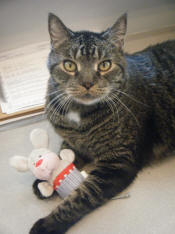Senior Wellness - Dogs
At age seven your dog becomes a “Senior Citizen”. Older pets, like their human counterparts, are more likely to develop age-related problems many of which, if discovered in the early stages, can be successfully treated maintaining or improving your pet’s quality of life. As partners in your pet’s wellness, we are committed to making focused care available for your aging dog.
Senior Wellness Exam:
Your faithful family member has reached the age when a comprehensive physical examination performed twice a year could save his or her life. In addition to assessing what the doctor can see- your dog’s eyes, ears, skin, mouth, and general condition- our doctors will address those conditions not visible by placing extra emphasis on internal wellness, arthritis, and cognitive dysfunction (senility). Diagnosing and treating conditions early is crucial to your pet’s health.
Obesity is more common in older pets. As our pets age they begin to slow down and thus require fewer calories. However, many of us treat our dogs as though they are still in their prime. Obesity can complicate many of the problems that affect aging pets. Our doctors may advise a change in diet and consistent monitoring of your pet’s weight.
Fecal Exam:
A stool examination is done to identify any gastro-intestinal parasites that may be causing disease in your pet. Parasites can steal nourishment, cause tissue damage, release toxic substances, and can even cause anemia.
Heartworm Antigen Test:
Annual heartworm testing is vital to the overall health of your dog. Transmitted by mosquitoes, heartworm infection leads to Heartworm Disease which damages not only the heart but other primary organs and is life threatening. The Antigen Test detects the presence of adult worms in the heart and is the most reliable test currently available.
Microfilaria Test:
In the event that the Heartworm Antigen Test is positive, this test checks the blood for the presence of microfilaria (baby heartworms).
Vaccinations:
Vaccines of the highest quality are administered for protecting your pet. Rabies vaccination is required annually in our area. The 3 in 1 distemper vaccine provides protection for an extended period and is administered once every three years. Since older dogs are more likely to develop complications from Kennel Cough infection, the Bordetella vaccination is recommended for those dogs that visit the groomer or come in contact with other dogs. Leptospirosis vaccination is recommended for dogs that hunt, live in rural areas, or have access to wet environments.
CBC (complete Blood Cell Count), T4 (Thyroid) Panel, Comprehensive Serum Chemistry Panel:
As our pets age, organ systems often begin to decline. Blood tests can evaluate organ function and give us an idea of how well your pet is doing internally. Some diseases can be effectively treated and monitored with early diagnosis. If all tests are normal, then you have peace of mind knowing your baby is healthy and that a good baseline has been established.
Urinalysis:
A urinalysis includes the physical, chemical, and microscopic evaluation of the urine. It also includes a visual inspection of the urine sediment to look for crystals, cells or bacteria. It is an important screening tool whether or not an infection is suspected. A urinalysis checks the overall health of the kidneys and bladder.
LASER Therapy- 3 sessions:
Your old friend may begin to move more slowly, or start to have trouble getting up onto his or her favorite chair. These can be signs of arthritis. LASER (Light Amplification by the Stimulated Emission of Radiation) Therapy may be recommended as a way to reduce pain and inflammation. LASER treatment promotes healing, improves vascular activity, increases metabolic activity, and reduces the formation of scar tissue. Arthritic patients often benefit from LASER treatment and become more mobile.
LASER is a non-invasive, painless, and scientifically proven way to treat difficult conditions. It may reduce or eliminate the need for pain medication and in some cases LASER may be an alternative to surgery.
Glucose Curve:
If diabetes is diagnosed, this testing is used to establish the proper insulin dose needed for maintaining appropriate blood sugar levels. A Glucose Curve is performed every 7 to 10 days until insulin regulation is achieved; then periodically as needed to confirm dosage and maintenance.
Laser Therapy- 6 sessions:
Additional LASER therapy sessions may be recommended. The Plan allows for the purchase of up to 4 packages of 6 sessions at a discounted price.
Dental Care and Treatment:
Oral hygiene for senior pets is very similar to ours. Bad breath is commonly the first indicator of a dental problem. Often plaque build-up is present where bacteria grow causing irritation to the gums and periodontal disease. When irritated gums bleed, bacteria enter the bloodstream and are carried throughout the body affecting other vital organs. Kidney, liver, and heart disease are linked to poor dental health. A thorough teeth cleaning and polishing will not only improve your dog’s smile, it will promote total body health. The bottom line is:
Oral Health = Overall Health!
Radiographs (X-Rays):
Radiographs are used when indicated to evaluate the size and shape of your pet’s internal organs as well as the condition of his or her bones, joints, and back. Other suspected injuries, abnormalities, or foreign objects may be revealed by X-Ray that can aid in diagnosis and treatment of certain conditions.
Blood Pressure Monitoring:
Just like us, high blood pressure can be the first hint of heart or kidney disease. High blood pressure increases the risk of blood clots and organ damage.
Tonometry:
Pressure inside of the eye is measured painlessly with an instrument called a Tonometer. This test screens for Glaucoma; an imbalance in production and drainage of eye fluid. High pressure can also damage the optic nerve which can lead to blindness
Senior Wellness - Cats
At age seven your furry feline friend becomes a “Senior Citizen”. Older pets, like us, are more likely to develop age-related problems many of which, if discovered in the early stages, can be successfully treated maintaining or improving your pet’s quality of life. As partners in your pet’s wellness, we are committed to making focused care available for your aging cat.
Senior Wellness Exam:
Your furry family member has reached the age when a comprehensive physical examination performed twice a year could save his or her life. In addition to assessing what the doctor can see- your cat’s eyes, ears, skin, mouth, and general condition- our doctors will address those conditions not visible by placing extra emphasis on internal wellness, arthritis, and cognitive dysfunction (senility). Diagnosing and treating conditions early is crucial to your pet’s health.
Obesity is more common in older pets. As our pets age they begin to slow down and thus require fewer calories. However, many of us treat our cats as though they are still kittens. Obesity can complicate many of the problems that affect aging pets. Our doctors may advise a change in diet and consistent monitoring of your pet’s weight.
Fecal Exam:
A stool examination is done to identify any gastro-intestinal parasites that may be causing disease in your pet. Parasites can steal nourishment, damage tissue, release toxic substances, and can even cause anemia.
Vaccinations:
Vaccines of the highest quality are administered for protecting your cat. The PureVax line of vaccines are adjuvant free and are the safest on the market. Rabies vaccination is required and is given annually in our area. Vaccination for Leukemia is done annually while the 3 in 1 distemper vaccine, which provides extended protection, is administered once every three years.
CBC (complete Blood Cell Count), T4 (Thyroid) Panel, Comprehensive Serum Chemistry Panel:
As our cats age, organ systems often begin to decline. Blood tests can evaluate organ function and give us an idea of how well your pet is doing internally. Some diseases can be effectively treated and monitored with early diagnosis. If all tests are normal, then you have peace of mind knowing your baby is healthy and that a good baseline has been established.
Urinalysis:
A urinalysis includes the physical, chemical, and microscopic evaluation of the urine. It also includes a visual inspection of the urine sediment to look for crystals, cells or bacteria. It is an important screening tool whether or not an infection is suspected. A urinalysis checks the overall health of the kidneys and bladder.
Glucose Curve:
If diabetes is diagnosed, this testing is used to establish the proper insulin dose needed for maintaining appropriate blood sugar levels. A Glucose Curve is performed every 7 to 10 days until insulin regulation is achieved; then periodically as needed to confirm dosage and maintenance.
Leukemia / FIV / Heartworm Test:
Your cat can be infected with Feline Leukemia Virus or FIV (Feline Immuno-deficiency Virus) without showing any signs of illness. These contagious diseases can cause numerous health problems, especially in older cats. If infection is suspected, our doctors may recommend testing before performing any other diagnostics or treatments in order to assist you with decisions regarding your cat’s health.
A positive test may affect the choices you make regarding your cat’s environment and lifestyle.
Because these diseases are contagious, this knowledge can help you to stop your cat from spreading the viruses to other cats in your household or in your neighborhood.
Heartworm infection in cats is becoming more common. Cats may not show signs of infection which can be suddenly fatal. Transmitted by mosquitoes, heartworm infection leads to Heartworm Disease which damages not only the heart but other primary organs and is life threatening.
Laser Therapy- 6 sessions:
Additional LASER therapy sessions may be recommended. The Plan allows for the purchase of up to 4 packages of 6 sessions at a discounted price.
Dental Care and Treatment:
Oral hygiene for senior pets is very similar to ours. Bad breath is commonly the first indicator of a dental problem. Often plaque build-up is present where bacteria grow causing irritation to the gums and periodontal disease. When irritated gums bleed, bacteria enter the bloodstream and are carried throughout the body affecting other vital organs. Kidney, liver, and heart disease are linked to poor dental health. A thorough teeth cleaning and polishing will not only improve your dog’s smile, it will promote total body health. The bottom line is:
Oral Health = Overall Health!
Radiographs (X-Rays):
Radiographs are used when indicated to evaluate the size and shape of your pet’s internal organs as well as the condition of his or her bones, joints, and back. Other suspected injuries, abnormalities, or foreign objects may be revealed by X-Ray that can aid in diagnosis and treatment of certain conditions.
Blood Pressure Monitoring:
Just like us, high blood pressure can be the first hint of heart or kidney disease. High blood pressure increases the risk of blood clots and organ damage.
Tonometry:
Pressure inside of the eye is measured painlessly with an instrument called a Tonometer. This test screens for Glaucoma; an imbalance in production and drainage of eye fluid. High pressure can also damage the optic nerve which can lead to blindness





